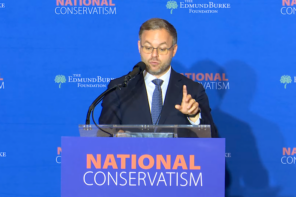Earlier this week, Mother Jones‘ Tim Murphy tried to connect the dots between Mitt Romney and Cleon Skousen, the ultra-conservative, anti-Communist LDS political theorist made famous by Glenn Beck. Murphy dug out an August 2007 radio interview Romney did with a Rush Limbaugh-esque political talk jock in Iowa, who, after goading Romney on his faith, turned the subject to Skousen.
Romney gamely played along. He told radio host Jan Mickelson that he once took a class from Skousen at Brigham Young University, admitted that had not read much of Skousen, and agreed that Skousen’s The Making of America might be “worth reading.” Murphy zeroes in the exchange in an effort to tie Romney to the conservative fringe.
Back in 2008, progressives grumbled when conservatives made controversy of Michelle Obama’s Princeton senior thesis on race. But Romney didn’t even have to write a thesis on or with Skousen to get a write-up in the progressive press. He just sat through one of his classes back in the day at BYU. Truth is, Mitt Romney probably couldn’t care less about Cleon Skousen, except as name to drop when trying to score on conservative talk radio. Murphy’s claim that as “a former Mormon bishop,” Romney certainly would have been familiar with Skousen’s “conspiratorial reputation” doesn’t ring true.
The Murphy piece highlights a problem the media (including left-leaning journalists) are facing right now as they furiously cast about for a handle on Romney story, desperately seeking content to feed the crazed digital media cycle: Mormonism is likely the most exciting element of the Romney story. How to spin Romney’s connection to the faith?
One well-worn option is to use his Mormonism to make Romney look fringe by connecting him to figures like Skousen. Call it the Jon Krakauer approach: focus on extreme political thought, or Mexican polygamy, or nineteenth-century history.
But as I’ve written here, the real story of Mormonism today is not at the sensational fringes. It’s about a twenty-first century church completing an aggressive transition from regionally-specific American theocracy to multinational corporation. It’s a story in which luxury shopping malls and gay suicides feature far more prominently than the White Horse prophecy.
Which brings us to a second option for how progressive journalists might go about reporting the Mormon angle on the Romney campaign. Forget Skousen. Stop thinking of Mormonism as a fringe religious movement. Imagine instead a powerful multinational network of financial and political influence brokers connected by a profound common bond: their multigenerational membership and service in the LDS Church. Yesterday, the New York Times tracked how a major Romney 2008 fundraiser leveraged his campaign connections to found a private equity firm. Just last week, the Salt Lake Tribune reported that an LDS Church official with the same last name mistakenly used a church email account to fundraise for Romney 2012. Pay attention to the names. Mormons do.
I cite these two recent stories not to suggest any kind of wrongdoing. What I am saying is that to understand the Mormon world that Mitt Romney moves in, the world that has shaped his perspective and priorities, journalists need to stop chasing the fringes and start really connecting the dots.




